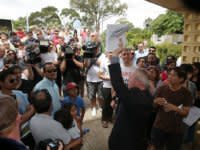A near-record number of cashed-up Australians are rushing back into the booming property market

When it comes to property, the proportion of Australians intending to buy a house has jumped back to record highs, according to the latest Commonwealth Bank (CBA) research.
The last high was recorded in early 2017, just before property prices in the major city markets of Sydney and Melbourne reached their all-time highs.
It comes as household spending remains in the doldrums, indicating that rate cuts are largely stimulating the housing market at the cost of everything else.
Time to bust out the party balloons, the real estate market is partying like it's 2017.
After a measly two-year downturn, homebuyers now appear to be back in a big way. The proportion of Australians planning on purchasing a house is back near all-time highs, propelled on by three rate cuts according to the latest Commonwealth Bank research.
"The one area where monetary policy stimulus is clearly working is the housing market," CBA chief economist Michael Blythe said in a note issued to Business Insider Australia. "Home buying intentions rose further in October and are now close to the record highs seen in [the first half of] 2017."
The "sharp uptrend", recorded in CBA's Household Spending Intentions read, is in stark contrast to the reluctance of most Australians to spend money on anything else.
The chart on the left indicates homebuyer sentiment, sharply rising in the last few months. It demonstrates its close relationship with house prices, having rising rapidly together as buyers return to the market.
While CBA credits the Reserve Bank of Australia's (RBA) rate cuts for buoying the market, they have done far less for consumer sentiment more generally, with the chart on the right showing only a small uptick.
What is evident in CBA's research is that RBA governor Philip Lowe's long-promised "gentle turning point" in the Australian economy may be finally manifesting, according to Blythe.
"That said, that turning point looks pretty modest when benchmarked against record-low mortgage rates, the wealth boost from rising house prices, solid jobs growth and tax rebates. The “discrepancy” reflects one of the risks we have warned about for a while now. That is, interest rate cuts are no longer delivering much in the way of a boost to disposable income," he said.
"And, by fuelling fears about the economic outlook, rate cuts are probably blunting some of the potential boosts from tax rebates and rising house prices."
It's a concern, Blythe admits, given the real value of retail spending is at its lowest level since the early nineties recession. Meanwhile, the intention to buy a car -- the second biggest purchase consumers make and one of the lead economic indicators -- remains "deep in negative territory".
All in all, the RBA will be more than a little concerned if Australians keep buying property at the cost of everything else.

 Yahoo Finance
Yahoo Finance 
